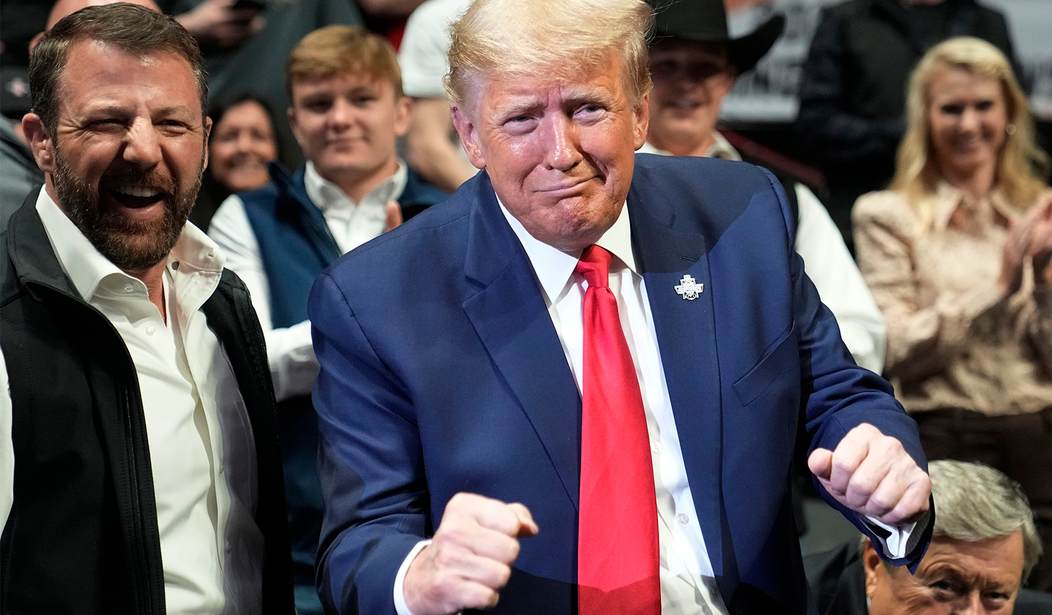The Club for Growth has had a troubled relationship with former President Donald J. Trump, never more so than in this cycle, when the conservative watchdog and defender of economic orthodoxy spent $6 million on a series of 40 ads attacking Trump—ads that did minor damage, and some that actually drove up Trump’s numbers.
David McIntosh, the Win It Back PAC leader and the author of the Sept. 28 memo to PAC contributors explaining the results, told RedState the ad project is on pause.
The former Indiana Republican congressman said while other media outlets have portrayed the ad project as a failure, he believes WIB proved that they learned how to attack Trump and drive down his numbers effectively.
According to the memo, the ads took Trump's total favorability in targeted Iowa markets from 70 percent, July 6 through July 10, to 62 percent, August 27 through August 31. However, in the same period, Trump’s Very Favorable rating barely moved, going from 47 percent to 45 percent.
McIntosh said the most effective ads acknowledge Trump’s accomplishments. “Hey, I voted for him before.”
The former congressman, who also leads the Club for Growth and was a co-founder of the Federalist Society, wrote in his memo:
It is essential to disarm the viewer at the opening of the ad by establishing that the person being interviewed on camera is a Republican who previously supported [former] President Trump; otherwise, the viewer will automatically put their guard up, assuming the messenger is just another Trump-hater whose opinion should be summarily dismissed.
The memo continued:
Broadly acceptable messages against [former] President Trump with Republican primary voters that do not produce a meaningful backlash include sharing concerns about his ability to beat President Biden, expressions of Trump fatigue due to the distractions he creates and the polarization of the country, as well as his pattern of attacking conservative leaders for self-interested reasons.
The Club for Growth president said although the WIB ads cracked the Trump code because there was no consolidation in the anti-Trump lane, the ads would not serve a positive purpose.
He said a pause was strategic until a candidate emerged to challenge Trump.
He said WIB's criticism of Trump was motivated by the desire to win in 2024 after the disappointments in 2020 and 2022.
Those criticisms are not hard-wired, as with people in the NeverTrump or Lincoln Project camps, so that if Trump wins the Republican nomination, McIntosh said WIB and its donors intend to back the president in the general election.
“We want to beat Joe Biden,” he said.
What did not work in attacking Trump
“All attempts to undermine his conservative credentials on specific issues were ineffective, regardless of the setting (live surveys, online surveys, focus groups, controlled experiments),” wrote McIntosh in his memo.
McIntosh, who has been complimentary to Trump’s top rival, Florida Republican Gov. Ron DeSantis, was brutally honest about the project to take down Trump’s polling numbers—using many of the same rhetorical points used by the Florida governor:
Even when you show video to Republican primary voters - with complete context - of [former] President Trump saying something otherwise objectionable to primary voters, they find a way to rationalize and dismiss it. This does not mean issue attacks against him will never work during the campaign, but rather, it means they failed to work during the initial phase of the campaign when we tested these options. This research should be ongoing throughout the primary.
McIntosh told The New York Times WIB even focus-grouped an ad voiced by former Wyoming Republican congresswoman Liz Cheney critical of Trump’s handling of the January 6, 2021, protests; it actually helped Trump:
Win It Back did not bother running ads focused on Mr. Trump as an instigator of political violence or as a threat to democracy. The group tested in a focus group and online panel an ad called “Risk,” narrated by former Representative Liz Cheney, that focused on Mr. Trump’s actions on Jan. 6, 2021. But the group found that the Cheney ad helped Mr. Trump with the Republican voters, according to Mr. McIntosh.
In his memo, the Indianan singled out three particularly ineffective ads.
“The Road” focused on the former president’s handling of the COVID-19 pandemic and Trump’s praise for Dr. Anthony Fauci.
McIntosh explained how it performed--helping Trump:
This ad was our best creative on the pandemic and vaccines that we tested in focus group settings, but it still produced a backlash in our online randomized controlled experiment - improving [former] President Trump's ballot support by four points and net favorability by 11 points.
“No Better” described Trump’s willingness to work with Democrats to restrict gun rights. “King of Debt”
The memo’s evaluation called this ad the best of the worst:
This was the best-received post-production ad we tested in focus groups because participants responded well to the side-by-side video treatment of Biden and Trump saying similar things, but an online randomized controlled experiment showed it had zero impact on any measure of Trump's support.
In the “King of Debt” ad, WIB again found the dichotomy between what people say about issues and their support of Trump:
While focus group participants claimed that they were concerned with the mounting national debt, they admitted that they do not expect anyone to be able to do anything about it, which led them to completely dismiss the attack on [former] President Trump.













Join the conversation as a VIP Member